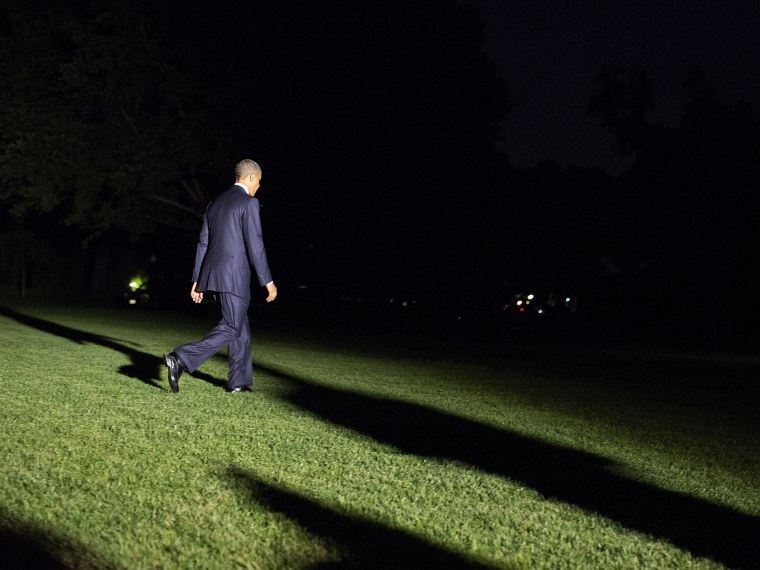Americans are feeling increasingly pessimistic about the direction of the economy, and a growing number disapprove of the way that President Obama is handling it, according to a new NBC News/Wall Street Journal survey.
Only 27% believe that the economy will get better over the next year, while 24% believe that it will get worse, and 48% believe it will stay the same, according to the poll, which was conducted in early September. It's the bleakest view of the economy since July 2012, despite gains made in the housing and job market over the past year.
Americans are also becoming more disenchanted with the president over the issue: 52% disapprove of the way that Obama is handling the economy— the highest level since August 2012—while 45% approve of his job handling it.
The president's overall approval rating is 45%, with a 50% disapproving of the job he's doing as president. That's only a slight change from the last poll in August (44% approval to 48% disapproval), but it's still close to his all-time low approval rating of 44%.
In particular, Obama's focus on the Middle East isn't winning him plaudits as Americans have become increasingly isolationist: 57% disapprove of the president's approach to Syria, while just 28% approve. The vast majority of Americans—74%—want the U.S. to focus on problems at home, rather than promote democracy and freedom in other countries. Back in May 2005, only a slight majority of 54% felt similarly.
Obama acknowledged on Thursday that ordinary Americans have other issues on their minds. "Even as we are spending lot of time on the Syria issue and making sure international attention is focused on the horrible tragedy there, it's still important to recognize that we got a lot more to do here in this government," he said, mentioning the need to tackle jobs, education, and the budget.
Overall, Americans' biggest economic concerns are having access to affordable health care (34%), saving enough for retirement (29%), and paying for their groceries and utility bills (26%). A majority also said the financial crisis had personally affected them "a great deal" or somewhat, and only 14% now feel positively toward Wall Street.
Low-income Americans, moreover, aren't feeling encouraged about their prospects of reaching the middle class. Only 29% of those who identified as poor and working-class say it's likely they'll be middle-class in the next five to seven years. Meanwhile, 43% of those who currently identify as middle-class say it will be very, fairly, or somewhat likely that they will fall out of the middle-class over the next several years.
But the gloomy outlook on the economy and the president isn't pushing Americans into the arms of the GOP. Only 28% have a positive view of the Republican Party, while 40% feel positively about the Democratic Party. Respondents were also far more likely to view Democrats as looking out for the middle class (41%) than Republicans (24%). When asked which individuals or groups represented the middle class best, respondents' top three choices were Bill Clinton, Barack Obama, and the Democratic Party.
At the same time, Republicans are gaining ground on some major issues. Americans are more likely to believe the GOP is better at dealing with the economy than Democrats by a 33% to 29% margin, reversing their views from February 2013. They're also feeling more positively about Republicans' approach toward reducing the deficit, ensuring a strong national defense, and dealing with health care.
But despite such GOP gains—and the public's general disapproval of Obamacare—Americans are still more likely to trust Democrats on health care than Republicans by 37% to 29%.
The poll surveyed 1,000 adults between September 5-8, with a 3.1% margin of error.
